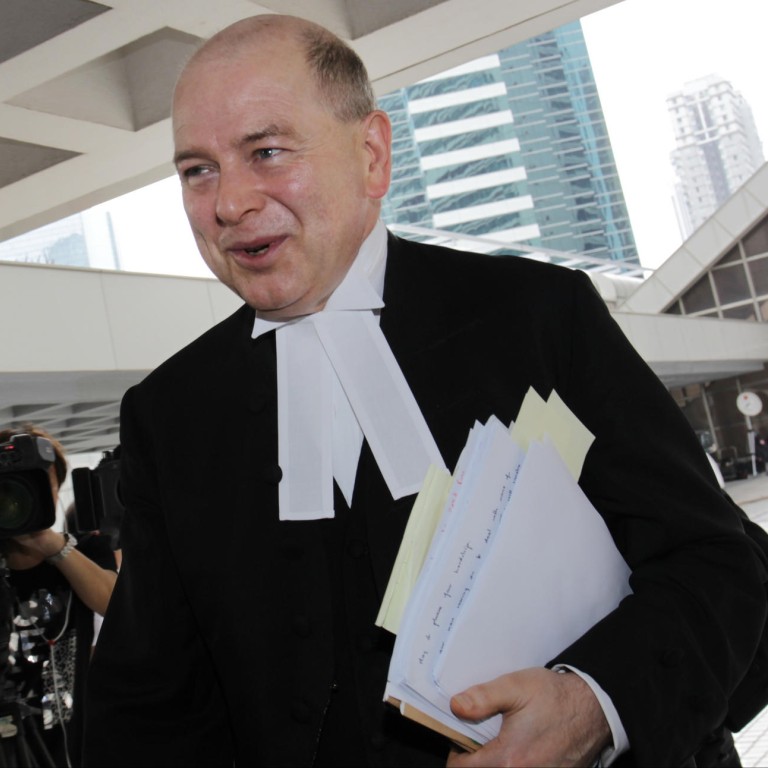
Rafael Hui corruption trial: the multimillion-dollar clash of legal titans
The corruption trial labelled the highest-profile in Hong Kong's post-colonial history could be unparalleled in the dominance of some of the biggest names on the British Bar.
The courts may be used to sparring matches, but the corruption trial labelled the highest-profile in Hong Kong's post-colonial history could be unparalleled in the dominance of some of the biggest names on the British Bar.
The most prestigious rank of lawyers, known as the Queen's Counsel, formed the pillars of legal teams from the prosecution and three defendants from Sun Hung Kai Properties: co-chairmen Thomas Kwok Ping-kwong and Raymond Kwok Ping-luen and executive director Thomas Chan Kui-yuen.
Audiences in the open court had front-row seats to the grilling of defendants and witnesses, particularly by David Perry QC, who led the prosecution team and spoke most of all the barristers.
Not only did he call more than 50 witnesses, he also spent a great deal of time questioning Thomas Kwok, Chan and former chief secretary Rafael Hui Si-yan, the three defendants who took the witness stand.
Taking on Hui, Perry did not mince his words.
"Do you think, looking back, that you were a person who can be trusted as chief secretary with integrity?" he asked.
Hui answered: "Up to now, I still think that I had been loyal to my duty as the chief secretary. I did not have any bias, I did not abuse my office, and I had done my part. But regarding the question you raised regarding my integrity, I agree."
Perry asked: "Was your overriding duty of loyalty to the people of Hong Kong or was it to a property developer?"
"As a chief secretary, of course I had to be responsible for the Hong Kong people."
A few weeks later, Perry asked Thomas Kwok: "I just want to get something straight - it looks like Mr Hui is being paid by an indirect route?"
The tycoon answered: "I can only say that the money did not come from me like that. I did not pay Rafael Hui through that."
"Does it look complicated?"
"Not very complicated."
Perry's aggressive probing contrasted with the quiet presence of his prosecution colleagues, including Joseph Tse Wah-yuen SC and British lawyer Louis Mably - who was "the first junior to be admitted to the Hong Kong Bar in over 30 years", according to his online biography.
Junior local barristers represented Hui and his childhood friend, former stock exchange official Francis Kwan Hung-sang, but their British counterparts for the other three defendants came to their aid from time to time.
"The fates of the five defendants were, to a certain extent, interconnected," a participating lawyer said, on condition of anonymity. "That is why the multimillion-dollar defence QCs did seem to be speaking on their behalf sometimes."
Meanwhile, the leading barristers for the two Kwok brothers adopted very different approaches from each other.
Clare Montgomery QC actively defended her client Thomas Kwok, introducing his case at the stage when prosecution witnesses were still testifying and the court had not yet moved on to defence testimony. By contrast, John Kelsey-Fry QC asked those witnesses not a single question.
Indeed, wrapping up his defence arguments, Kelsey-Fry said the prosecution's case against his client Raymond Kwok was so weak that it rendered any questioning from him unnecessary.
At the outset, as the High Court dealt with preliminaries before the jury was empanelled, Kelsey-Fry had argued against the disclosure of Raymond Kwok's diary entries to the jury.
But Mr Justice Andrew Macrae rejected the request, so the public learned how Raymond Kwok was privately happy about the resignation of chief executive Tung Chee-hwa in 2005.
"Tung resigning good a lot of energy" were his words a day after the announcement.
The diaries also showed the Kwoks met Hui frequently during the bribery period between June 2000 and January 2009, inclusive of Hui's time in government, the prosecution said.

